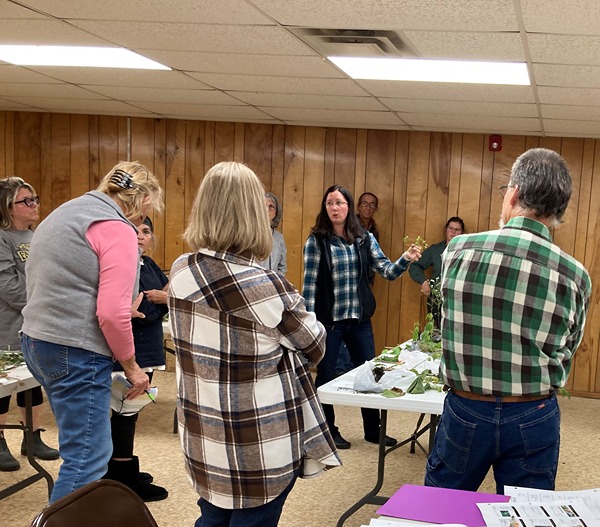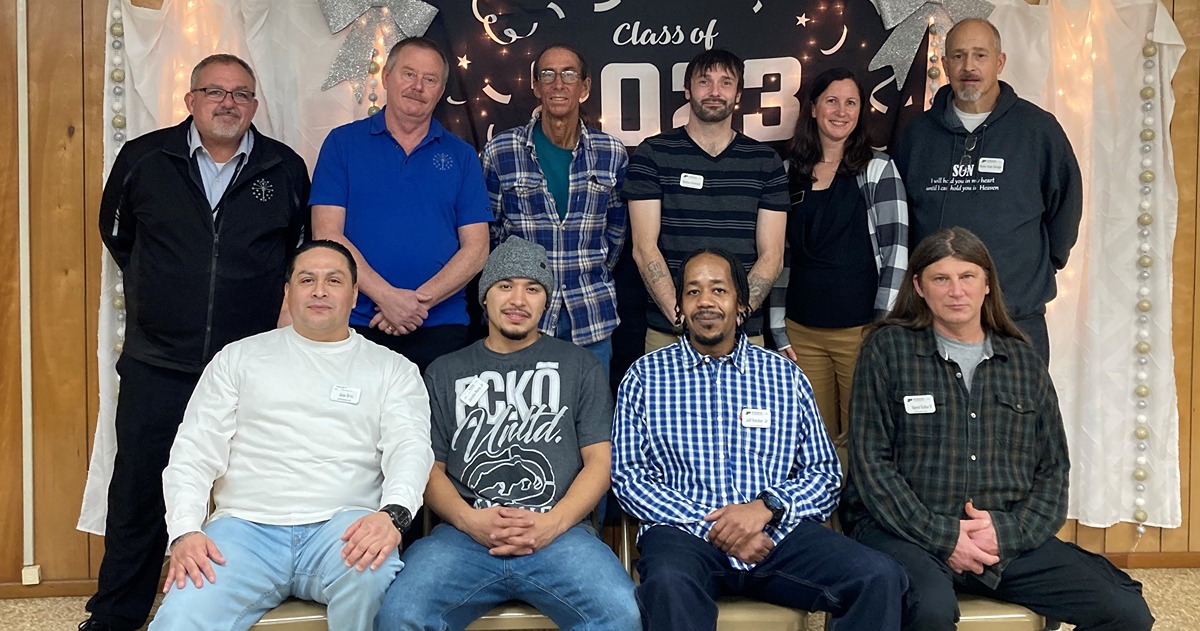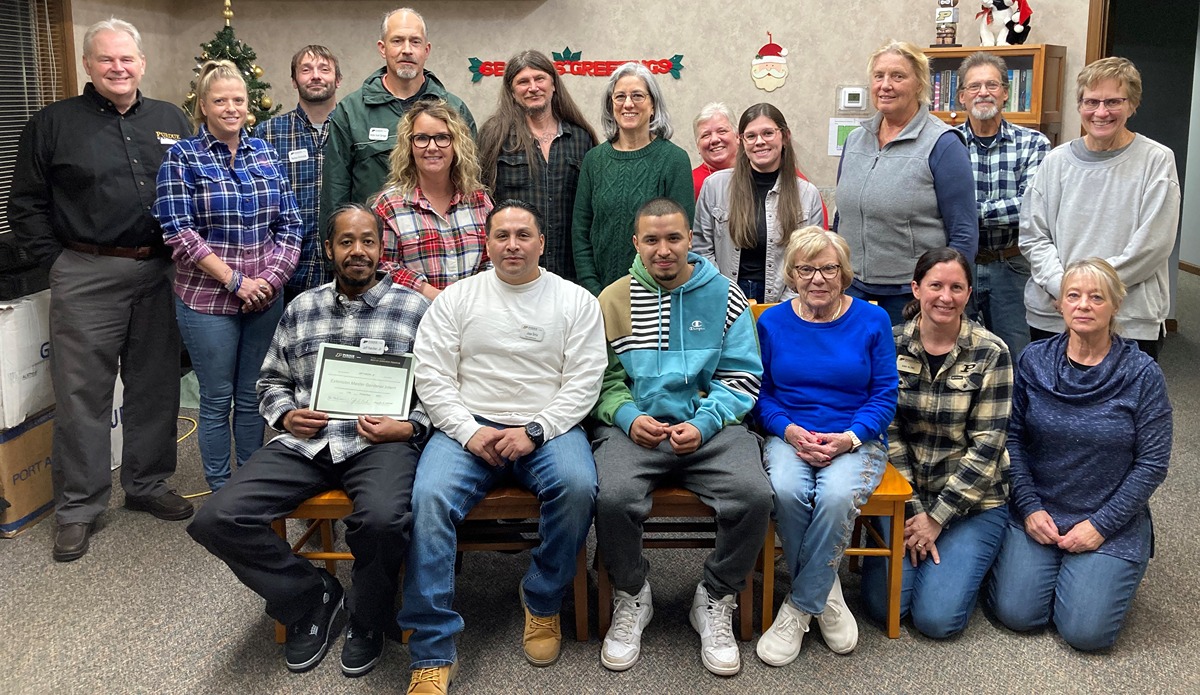Rehabilitation through cultivation—from incarceration to Master Gardeners
When he thinks of his childhood, Jacobo Mora recalls rows of fruit trees and colorful squash at Kercher’s Sunrise Orchard in Goshen, Indiana. Mora worked and saved up as a young man to buy a house with three apple trees in the backyard, hoping to eventually start his own humble orchard and farmstead. He looked forward to a place for his family to grow their own food. A place where he could teach himself and his children to be self-sufficient and resilient. A place, a dream that was one of many things he lost when he was incarcerated.
Leaving his old life behind, Mora struggled with the isolation he experienced in prison. But, through the Chain O’Lakes Community Re-Entry Center, he and others have found their way back to communities through nature.
Eleven out of 13 lakes connect in Noble County, Indiana, and form the Chain O’ Lakes State Park that attracts both kayakers and fishermen. The re-entry center’s residents maintain the park as part of their transition back to society.The three vegetable gardens in the park were started by Bruce Kennedy, a Purdue Extension Master Gardener, caseworker Doug Foley and the residents of the re-entry center. The gardens have evolved as their caretakers learn more about horticulture, agronomy and botany through classes taken at the facility.
“My mother has a little garden in the backyard, and she’s always talked about it. I just became interested in it because of what I learned here,” resident Jeff Hatcher said of his experience at the re-entry facility. “Now, of course, my mother says she has a lot of work for me to do in her garden.”
Noble County Master Gardeners have taught classes at the facility for 15 years, but it was the residents who applied their skills beyond the park. After seeing lines of people waiting for food, residents connected with the Central Noble Food Pantry, where they now donate at least two tons of fresh fruits and vegetables from their gardens every year.
The residents, including Nathan Dimmock, have seen the impact their produce has had on the food pantry. Dimmock said, “It’s really cool when we go there to work. People come and get the fresh produce, and they're so happy to have it. Sometimes you take things like that for granted.”
That initiative to create positive change also inspired Ann Kline, coordinator and instructor for the Master Gardener Program in Noble County, and Charles Bowen, a re-entry center warden, to welcome residents into another class. Every fall, Noble and Whitley counties host a basic training program for prospective Master Gardeners. Of the 16 individuals from Noble, Whitley and Allen counties who completed the course this year, the six residents from the re-entry center felt that they had an unfair advantage on the final exam.
Resident Daniel Collar said, “Bruce teaches a class here, and he knows so much about everything. When we took the test, we all pretty much aced it because we had already received so much knowledge from him.”
Not everything came easily. The residents from the re-entry center had to pay the same $175 fee as everyone else. Even with scholarships, the residents had to save their pay from work assignments to take the class.
As Master Gardener interns, they also have to complete 40 hours of volunteer work to earn certification. They’ll be volunteering at the food pantry, growing and donating food and teaching the winter gardening course at the re-entry center. Plus, they’ll still be expected to attend some Master Gardener meetings, but that’s more of a bonus to them.
 “We attended an all-day symposium, along with 120 other gardeners and Master Gardeners, in Whitley County a couple of weeks ago,” resident Andy Spriggs said. “I’ve been locked up for five years now and being out in the community like this is really good for my soul. It encourages me to want to do more.”
“We attended an all-day symposium, along with 120 other gardeners and Master Gardeners, in Whitley County a couple of weeks ago,” resident Andy Spriggs said. “I’ve been locked up for five years now and being out in the community like this is really good for my soul. It encourages me to want to do more.”
In the middle of the course, Mora graduated from the re-entry center and moved an hour away. Although no longer obligated to attend, he arranged for rides back to the class every week, including some from the Master Gardener who he started with at the re-entry facility, Kennedy.
“I wanted to do something good for myself, and gardening gave me that,” Mora said. “It was like a hobby, like knitting—it calmed my mind. And the classes were great because I found the right people at the right time. It was easy to ask them questions, be vulnerable and comfortable.”
Kline, the instructor of the course, was struck by the residents’ motivation to learn and invest in their future. “The motto of the Master Gardeners is ‘Helping Others Grow.’ Not only did we help the residents grow, but they are going to reach and grow so many others.”
Resident Jose Ortiz is especially interested in taking his newfound knowledge back to his community. He understands the barriers to educational resources for those who don’t speak English and wants to start breaking down these walls in gardening and plant sciences.
“This program has been therapeutic by allowing me to give back to the community,” Ortiz said. “Knowing that we are making a difference in society and an impact in helping feed those who are less fortunate gives me a purpose. I’m proud to have learned this. I want to teach this to other people, especially the Hispanic community, who don’t know English. I think this will have a big impact on them, too.”
No matter the residents’ next path in life, they will carry their knowledge with them. Mora provides proof of that: while working with his uncle to restore homes, he’s actualizing the dream of a mini farmstead in his backyard. He’s already started a chicken coop and plans on planting a garden in the spring. And, although Mora has the basics down, he knows he can reach out to his fellow Master Gardeners whenever he has questions.
 Six residents from the Chain O'Lakes Community Re-Entry Center graduated from the Master Gardener Basic Training course this year and had several people cheering them on. From left and top: warden Charles Bowen, caseworker Doug Foley, Master Gardener Bruce Kennedy, resident Nathan Dimmock, Master Gardener Ann Kline, resident Andy Spriggs, resident Jose Ortiz, resident Jacobo Mora, resident Jeff Hatcher and resident Daniel Collar.
Six residents from the Chain O'Lakes Community Re-Entry Center graduated from the Master Gardener Basic Training course this year and had several people cheering them on. From left and top: warden Charles Bowen, caseworker Doug Foley, Master Gardener Bruce Kennedy, resident Nathan Dimmock, Master Gardener Ann Kline, resident Andy Spriggs, resident Jose Ortiz, resident Jacobo Mora, resident Jeff Hatcher and resident Daniel Collar. In a re-entry facility, these men are trained for the workforce and given access to education, but—through the Master Gardeners Program—we bring them back into the community.”
- Ann Kline, coordinator and instructor for the Master Gardener Program in Noble County








